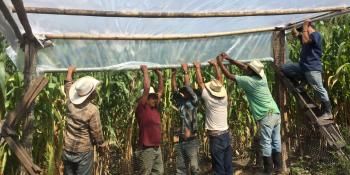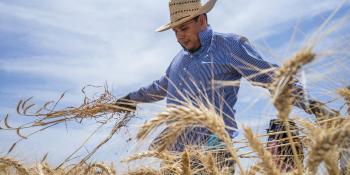Scaling up climate-smart practices using ICT in Odisha

Enhanced knowledge and understanding of crop management assist farmers to tackle climate change in a smarter way.
Implementing climate smart agriculture (CSA) in collaboration with farmers of the Odisha state in India will be difficult at best, but without farmers’ input and acceptance, it will be impossible. Hence, communication must be expanded to reach farmers and support the exchange of information. This requires the mobilization of all types of media and groups close to the farming population, such as civil society organizations and the private sector, including insurance and telephone companies.
One strategy for reaching the farmers is the active promotion of public-private-partnerships (PPP) that enable farmers to adopt technologies and innovations that achieve higher and more stable yields, increase their income, and raise regional welfare, all without compromising the environment. Furthermore, new communication tools like audio communication (e.g. audio conferencing) are now being used to communicate climate related advisories to farmers.
By integrating these information and communication technologies (ICTs) with existing commercial or government platforms, the sustainability and scalability of these initiatives are ensured. It is also anticipated that many government departments will find these knowledge-based systems extremely useful in making their extension initiatives more effective by providing them with up-to-date location specific information.
Multi-location Audio Conference Programme on Fertilizer and Weed Management in Paddy
Another strategy to connect with farmers is the development of a web-based decision support tool, named Rice Crop Manager (RCM). This tool strengthens farmers’ decision making power for site specific nutrient management, which brings resilience to climate change. RCM provides customized crop and nutrient management recommendations to farmers based on their actual field conditions and needs. For example, it helps to regulate fertilizer use for each growth stage of plants. This enhances productivity through site specific nutrient management, which can be used by both small and large farm-holders. The enhanced knowledge and understanding of crop management that farmers gain when using RCM, will assist them to tackle climate change in a smarter way. RCM is now available in three languages: Odiya, Hindi and English.
Thanks to RCM, Odisha rice farmers are now receiving site-specific fertilizer recommendations for their crops without having to leave their villages. What is still lacking, however, is a sufficient pool of experts and extension personnel that can reach out and educate the farmers on the technologies at hand. Hence, to catalyze dissemination of best management practices for paddy cultivation, a multi-location audio conference programme on fertilizer and weed management was organized on July 10 2019 at the International Rice Research Institute (IRRI), Odisha office.
This online audio conference brought together 40 farmers across different districts of Odisha to discuss their queries related to fertilizer and weed management. Weed management experts from Odisha University of Agriculture and Technology also joined to answer the farmers' queries. Many farmers asked about how to determine the optimal fertilizer quantity and application frequency for their high yielding and hybrid varieties for the Kharif season. They were then advised to visit the common service centre (CSC) and RCM Kendra’s for getting field specific recommendations for fertilizer and weed management. Farmers also asked about variety suited to their areas, nursery management, insect and pest control.
Way forward
These audio conferences are an efficient channel for rapid communication and dissemination of technologies to a wide audience. This will allow many farmers to make better decisions related to their fertilizer and weed management. In addition, the project aims to engage youth in agriculture, and to create alternative communication pathways in addressing information poverty on rice farming in rural communities of Odisha. Furthermore, through the communication of the seasonal forecast, including seasonal duration, final and start rain date, the campaign hopes to contribute to better decision-making for climate risk management.
Read more:
- RCM advisory service for Odisha: http://webapps.irri.org/in/od/rcm/
- RCM advisory service for Bihar: http://webapps.irri.org/in/br/cmrs/
Ajay Kumar Mishra is Associate Soil Scientist. Preeti Bharti and Dharamvir Singh Rana are Specialist, and Sheetal Sharma is Soil Scientist with IRRI.



